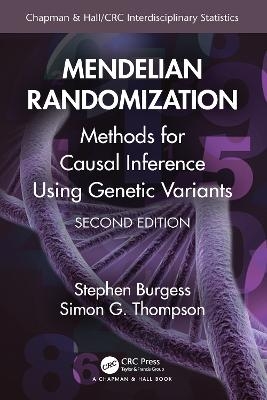
Mendelian Randomization
Chapman & Hall/CRC (Verlag)
978-1-032-01951-2 (ISBN)
Mendelian Randomization: Methods For Causal Inference Using Genetic Variants provides thorough coverage of the methods and practical elements of Mendelian randomization analysis. It brings together diverse aspects of Mendelian randomization from the fields of epidemiology, statistics, genetics, and bioinformatics.
Through multiple examples, the first part of the book introduces the reader to the concept of Mendelian randomization, showing how to perform simple Mendelian randomization investigations and interpret the results. The second part of the book addresses specific methodological issues relevant to the practice of Mendelian randomization, including robust methods, weak instruments, multivariable methods, and power calculations. The authors present the theoretical aspects of these issues in an easy-to-understand way by using non-technical language. The last part of the book examines the potential for Mendelian randomization in the future, exploring both methodological and applied developments.
Features
Offers first-hand, in-depth guidance on Mendelian randomization from leaders in the field
Makes the diverse aspects of Mendelian randomization understandable to newcomers
Illustrates technical details using data from applied analyses
Discusses possible future directions for research involving Mendelian randomization
Software code is provided in the relevant chapters and is also available at the supplementary website
This book gives epidemiologists, statisticians, geneticists, and bioinformaticians the foundation to understand how to use genetic variants as instrumental variables in observational data.
New in Second Edition: The second edition of the book has been substantially re-written to reduce the amount of technical content, and emphasize practical consequences of theoretical issues. Extensive material on the use of two-sample Mendelian randomization and publicly-available summarized data has been added. The book now includes several real-world examples that show how Mendelian randomization can be used to address questions of disease aetiology, target validation, and drug development
Dr Stephen Burgess is an MRC Investigator at the MRC Biostatistics Unit in Cambridge, an internationally acclaimed research institute in medical statistics. He holds a Wellcome Trust Sir Henry Dale Fellowship, and leads a research group which aims to develop statistical methods that use genetic variation to answer clinically relevant questions about disease aetiology and prevention. He was previously located at the Cardiovascular Epidemiology Unit in the University of Cambridge, where he held a Sir Henry Wellcome Postdoctoral Fellowship. His main research interests are in causal inference and evidence synthesis. Professor Simon Thompson was Director of Research in Biostatistics at the Cardiovascular Epidemiology Unit in the University of Cambridge until his retirement in 2018. He is a Fellow of the Academy of Medical Sciences. From 2000-2011, he was Director of the MRC Biostatistics Unit in Cambridge. He held previous academic appointments at the London School of Hygiene and Tropical Medicine, and as the first Professor of Medical Statistics and Epidemiology at Imperial College London. In retirement, he has cut down his research activities substantially, and is not getting involved in new research projects.
I Understanding and Performing Mendelian Randomization1. Introduction and Motivation
2. What is Mendelian Randomization?
3. Assumptions for Causal Inference
4. Estimating a Causal Effect from Individual-level Data
5. Estimating a Causal Effect from Summarized Data
6. Interpretation of Estimates from Mendelian Randomization
II Advanced Methods for Mendelian Randomization7. Robust Methods using Variants from Multiple Gene Regions
8. Other Statistical Issues for Mendelian Randomization
9. Extensions to Mendelian Randomization
10. How to Perform a Mendelian Randomization Investigation
III Prospects for Mendelian Randomization11. Future Directions
| Erscheinungsdatum | 30.06.2021 |
|---|---|
| Reihe/Serie | Chapman & Hall/CRC Interdisciplinary Statistics |
| Zusatzinfo | 10 Tables, black and white; 38 Line drawings, black and white; 38 Illustrations, black and white |
| Sprache | englisch |
| Maße | 156 x 234 mm |
| Gewicht | 453 g |
| Themenwelt | Mathematik / Informatik ► Mathematik |
| Studium ► Querschnittsbereiche ► Epidemiologie / Med. Biometrie | |
| Naturwissenschaften ► Biologie | |
| ISBN-10 | 1-032-01951-4 / 1032019514 |
| ISBN-13 | 978-1-032-01951-2 / 9781032019512 |
| Zustand | Neuware |
| Informationen gemäß Produktsicherheitsverordnung (GPSR) | |
| Haben Sie eine Frage zum Produkt? |
aus dem Bereich


